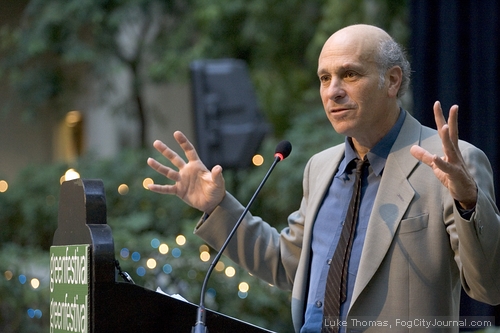
Author/Journalist Greg Palast discusses election fraud
during a keynote speech at the 2008 Green Festival in San Francisco.
Photos by Luke Thomas
November 18, 2008
Think that we, as a nation, have turned a corner since the November 4 election, and entered a new era of hope and change?
Well, don’t hit the snooze button yet, cautioned investigative journalist Greg Palast, green economies expert Van Jones, and Global Exchange co-founder Kevin Danaher at San Francisco’s seventh annual Green Festival this past weekend.
Amidst lyrical tunes wafting from dulcimers, winemakers serving samples of Zinfandel made from organically grown grapes, and dairy farmers dishing out free compostable cups of vanilla yogurt processed from grass-fed livestock, speakers Palast, Jones, and Danaher encouraged Americans to demand – and be a part of – real change.
In fact, judging from the sounds of their rhetoric, the honeymoon for Barack Obama, the president-elect of the United States and the first black president, is just about over.
A Black Face on Jim Crow?
Palast, the British Broadcasting Corporation muckraker who became famous for exposing a conspiracy to purge tens of thousands of African American voters from Florida voter rolls ahead of the 2000 and 2004 US presidential elections, opened his speech congratulating Obama on his victory and said he had evidence of fraud in the 2008 election.
According to Palast, half a million people registered to vote for the first time this year, with those new voters registering Democrat at a rate of more than three to one. Pollsters predicted a turnout of 133 million voters by November 4, and on the night of the election, polls indicated that Obama had won by a 15 million-vote margin. Yet final tabulations indicated that only 126 million people actually cast ballots.
“So where did seven to eight million votes go?” asked Palast.
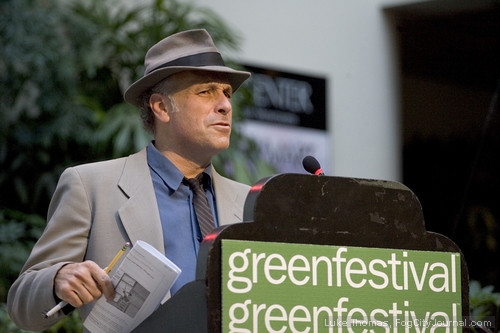
Lost, he believes, to a convergence of sinister legislation and Republican strategists to prevent Democrats from achieving a filibuster-proof, 60-vote majority in the U.S. Senate.
In January 2002, President George W. Bush signed the Help America Vote Act, which congressional Democrats and Republicans had overwhelmingly supported. Proposed as a solution to the disenfranchisement of voters in the 2000 election, what the act really does, says Palast, is empower election officials to arbitrarily purge new registrants.
Now, U.S. Senate races have yet to be resolved in three states – Alaska, Minnesota, and Georgia (though Alaska Sen. Ted Stevens has been convicted on corruption charges). In Georgia, where Republican Sen. Saxby Chambliss will be in a December 2 runoff with Democrat Jim Martin, 42 percent of new registrants – most of whom were black and registered Democrats – were denied their right to vote. New rules designed to establish a “digital dictatorship,” Palast argues, were created to empower elections officials to conduct a “silent purge.”
“Now, we finally have an African American president,” said Palast. “But we still have a Jim Crow voting system. My biggest fear is that we’ll get a black face on a Jim Crow voting system if we don’t fix the problems.”
Night of the Living Financiers
Palast also sees a new and worrisome specter in Obama’s selection of financial advisors to help him weather the nation’s economic crisis. The signs are already there that the nation’s first black president is ready to perpetuate the current model of bailing out wealthy institutions but not necessarily individual mortgage holders.
Palast interviewed Robert Pratt, an African American father of five living in Detroit, who has a subprime mortgage of $100,000 on a home now worth $40,000. Palast said if anyone is more deserving of economic relief, it would be people like Pratt who work three jobs, seven days a week, to pay the mortgage and feed their children.
And yet following the November 4 election, Obama met with 17 economic advisers, including some of the architects and beneficiaries of the current financial meltdown whose primary victims are people like Pratt: Robert Rubin, Treasury secretary from 1995 to 1999; Penny Pritzker, former chair of the Superior Bank of Chicago, CEO of the Pritzker Realty Group, and Democratic campaign finance chair; Lawrence Summers, former president of Harvard University, and Treasury secretary from 1999 to 2000; and Paul Volcker, chairman of the U.S. Federal Reserve from 1979 to 1987.
“It was as if he had opened the crypt and hosted the Night of the Living Financiers,” Palast said.
Within days of then-President Bill Clinton signing the 1999 Financial Services Modernization Act, which repealed the New Deal era Glass-Steagall Act that had created a barrier between banks and the stock market, Rubin became the director of Citibank and, soon after, its chair. Along with former Federal Reserve Bank Chair Alan Greenspan and Lawrence Summers, Rubin had also advocated for the deregulation of the derivatives market.
Just as bad for Palast was the presence of Pritzker, a Chicago financier whose business agreed to pay the Federal Deposit Insurance Corporation $460 million in 2001 in connection to the failure of Superior Bank due to predatory lending practices. Palast, who noted that KPFA Flashpoints anchor Dennis Bernstein had broken the story on Pritzker, had hoped that Obama was setting Pritzker up for a perp walk, but such was not to be.
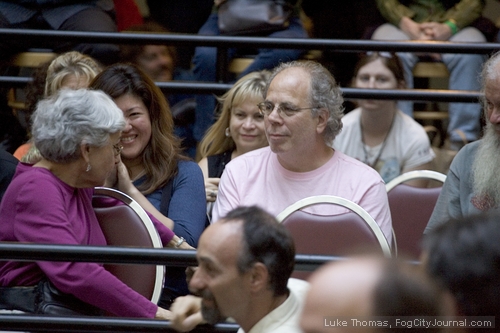
KPFA Flashpoints anchor Dennis Bernstein.
Presidential candidates John McCain and Hillary Clinton had both called for $300 billion to be made available for mortgage holders like Pratt. But Barack Obama’s response to the mortgage crisis has been, “Mr. Pratt should live in hope.”
“I think he should have a house,” Palast said.
Jones Calls for Green Economy R&D
While Van Jones, co-founder of the Ella Baker Center for Human Rights and author of The Green Collar Economy, initially asked his audience to give President-elect Obama an opportunity “to do right,” he was quick to share his critique of Obama’s environmental positions, referring to Obama’s willingness to compromise on offshore oil drilling, “clean coal” and “safe nuclear” energy options.
“We don’t just need to get off foreign oil,” countered Jones, “We need to get off oil – period.”
Clean coal, Jones added, “is a fantasy fuel … [that] represents a breakthrough in the marketing of coal but not a in the burning of coal.”
Equally implausible as clean coal would be “unicorns to pull our cars, or tooth fairies to bring us energy at night,” he said, because no one has yet found a way to safely dispose of the carbon dioxide released from burning coal.
“And don’t get me started on ‘safe nuclear,'” Jones said.
He called for a $200 to $300 billion to be invested in a national research and development project. In such a program, he said, out-of-work builders could now be doing reconstruction and weatherproofing of existing structures, and the nation could be harnessing wind power in the American heartland.
“Two-hundred to $300 billion used to sound like an expensive project, but now we know we cannot afford not to do it,” he said.
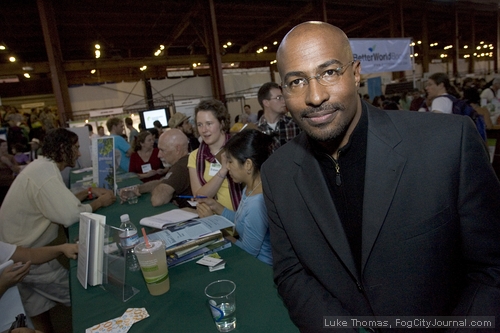
Author Van Jones
“Greenprint” for a New Economy
Danaher, who co-produced the Green Festival along with his wife, Medea Benjamin, and Co-op America’s Alisa Gravtiz, noted that while the traditional, corporate economy has been declining in recent years, the “green” economy is surging.
He has recently undertaken a new project – the creation of a Global Citizen Center in San Francisco. The center will house teachers, nurses, and firefighters, among others, and incorporate LEED building standards, rooftop gardening, and space for green retail in its design.
“With teachers, you multiply the green educational experience exponentially,” said Danaher, noting that many teachers cannot afford to live in the city and need to commute long hours to get to their jobs.
Negotiations are now underway to acquire an SFUSD-owned property in the Mission District that Danaher vows will not be converted into luxury condominiums. Plans are also in the works to create an “eco-industrial park” in the southeast sector of San Francisco and to acquire rural property to turn into a working “green” farm and retirement community for aging leftists.
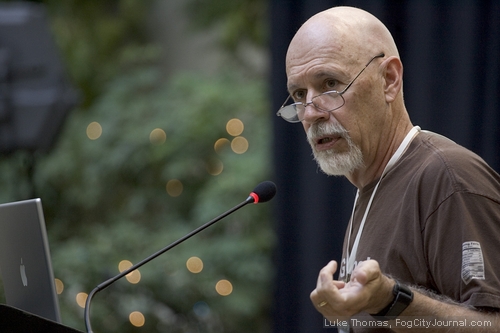
Aging lefty Kevin Danaher
“It’s not true that real estate is location, location, location,” Danaher said. “Real estate is location, financing, and zoning.”
“The subtext of the right wing is that government is bad. The subtext of the left wing is that government is us,” he added.


 The Hunger Site
The Hunger Site
No Comments
Comments for Greg Palast, Van Jones and Kevin Danaher
Headline San Francisco Green Festival are now closed.